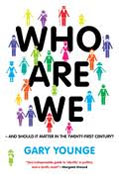Who Are We
Gary Younge
book reviews:
· general fiction
· chick lit/romance
· sci-fi/fantasy
· graphic novels
· nonfiction
· audio books
· author interviews
· children's books @
curledupkids.com
· DVD reviews @
curledupdvd.com
newsletter
win books
buy online
links
home
for authors
& publishers
for reviewers

 |
Who Are We - And Should It Matter in the 21st Century? Gary Younge Nation Books Hardcover 256 pages June 2011 |
|
When you fill out a form that asks for your ethnic origin, which box do you check? White, African American, Asian, Pacific Islander, Hispanic, Other? There’s a very good chance that you could rightfully claim to be a member of more than one of those groups, but you may have chosen only one as a useful method for presenting yourself to the world.
It is our nature as human beings to categorize. Our brains insist on doing it as a way of making quick and easy sense of our surroundings. We know, of course, that few things and no people fit so neatly into those check boxes, but we continue to process those around us in the same way that early hominids did – friend or enemy, like me or not like me. As Younge points out in Who Are We For the most part, power belongs to white Western males, who certainly represent the group depicted by these lines from Younge’s book: “Those most wedded to preserving their identity… are often powerful. When all is said and done, they have the most to lose. They just don’t refer to it as identity. They call it tradition, heritage or, simply, history.”Just like the White Privilege Knapsack, male privilege, which almost every male will deny having, is an identity advantage clearly visible to everyone except those within its shelter. Whether or not we think about it or like it or accept it, certain ethnic and cultural groups are assumed to be the norm, and all others are tacitly required to explain themselves. As Younge points out, “Nobody asks me when I first realized I was straight….” Because ‘straight’ is the cultural norm in his world, he is assumed to be part of the majority until someone spots a telltale sign that marks him as ‘Other.’ In Nazi Germany, Jews were forced to wear identifying stars on their clothing. In France these days, women who do not wear hijab are the norm, and the government has actually taken legal steps toward banning the wearing of any head covering that resembles the traditionally Muslim apparel. In the United States, there is still a raging controversy about the birthplace of Barack Obama, largely because he does not fit the image many have for President of the United States (i.e. he is not a white male), even though his mother is white and he was raised by his white family in their culture. Skin color, religion, ethnic background – why do these minute differences matter so much when our similarities are so much greater? According to Younge, “It is in no small part because the borders of our identities are so porous and fluid that some seek to police them so rigorously.”When we look objectively at the history of our species, we can see that it is “…to isolate one particular group from the rest of the human race.” It is far easier to draw circles around the Other and assure ourselves that we are superior than it is to acknowledge our commonality and accept our own flaws. Who Are We Who Are We Originally published on Curled Up With A Good Book at www.curledup.com. © Deborah Adams, 2011 |
|
|
|
 Click here to learn more about this month's sponsor! |
|
| fiction · sf/f · comic books · nonfiction · audio newsletter · free book contest · buy books online review index · links · · authors & publishers reviewers |
|
| site by ELBO Computing Resources, Inc. | |
 For Gary Younge, who was born and raised in England by parents originally from Barbados and who has lived in Sudan, France, the Soviet Union, and the United States, his answer is often challenged by those who have appointed him a category in keeping with the color of his skin while ignoring his accent and even his attempts to explain his heritage.
For Gary Younge, who was born and raised in England by parents originally from Barbados and who has lived in Sudan, France, the Soviet Union, and the United States, his answer is often challenged by those who have appointed him a category in keeping with the color of his skin while ignoring his accent and even his attempts to explain his heritage.